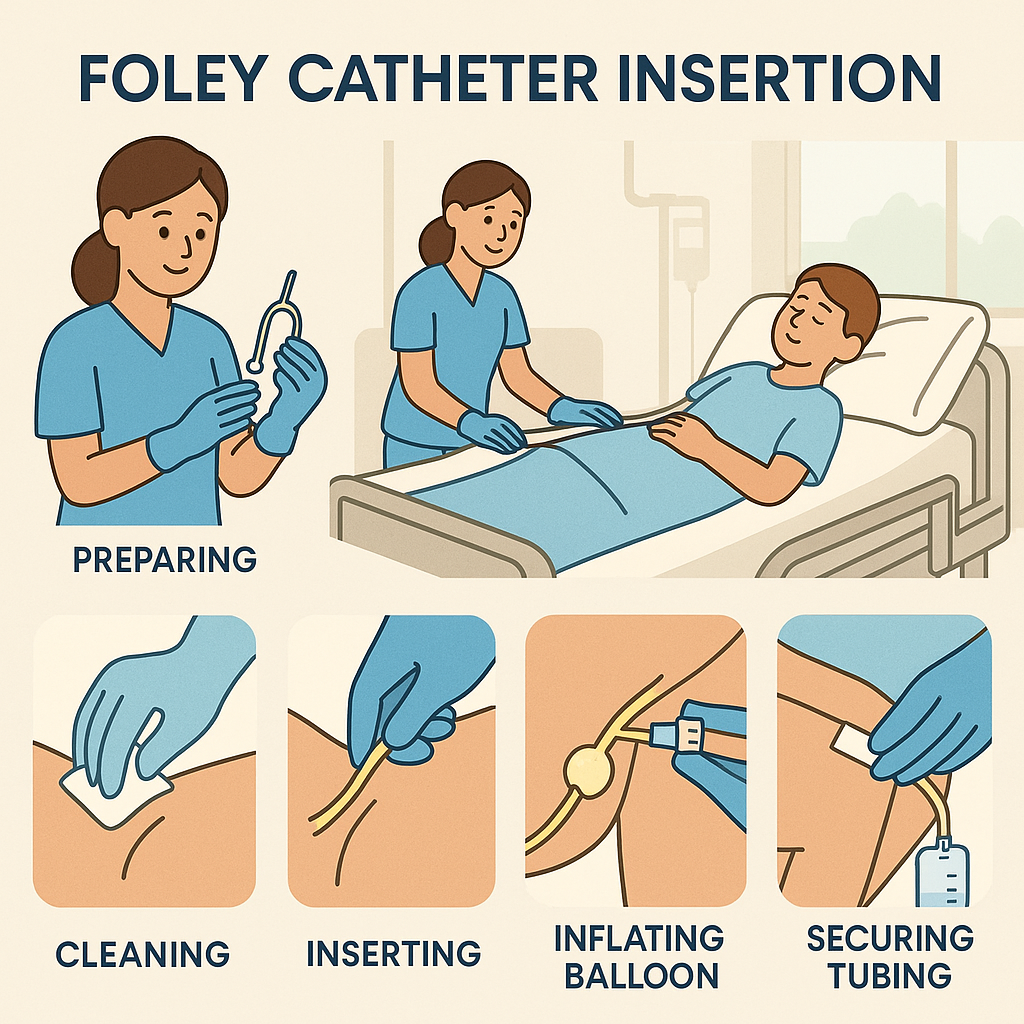Knowing how to safely insert and care for a Foley catheter is a must-have skill for every nurse. Whether you’re preparing for the NCLEX, starting out as a new registered nurse (RN), or reviewing procedures in your nursing bundle, mastering this technique ensures both patient safety and professional confidence. Moreover, understanding each step in detail helps reduce infection risks and improves patient outcomes.
📌 What Is a Foley Catheter?
A Foley catheter is a flexible tube inserted into the bladder to drain urine. It stays in place thanks to a small balloon inflated with sterile water. Typically, Foley catheters are used in hospitals for patients who:
- Cannot urinate independently
- Require strict urine output monitoring in critical care
- Are undergoing surgical procedures
Additionally, nurses may need to insert a Foley catheter during emergencies or for diagnostic purposes.
🗂️ Supplies You Need
Before beginning, always gather your equipment and verify the provider’s order. Proper preparation prevents delays and maintains sterility.
✅ Foley catheter kit (sterile gloves, drape, antiseptic, catheter, syringe prefilled with sterile water, drainage bag)
✅ Extra gloves
✅ Waterproof pad
✅ Securement device or tape
✅ Trash bag
💡 Tip: Always explain the procedure to your patient beforehand to promote comfort and cooperation.
🔑 Foley Catheter Insertion: Step-by-Step
Follow these organized steps carefully — and remember, maintaining sterile technique is absolutely critical.
1️⃣ Wash Hands and Set Up
Begin by performing hand hygiene thoroughly. Next, open the Foley kit using sterile technique and don sterile gloves. In addition, ensure all items are within easy reach before you start.
2️⃣ Position the Patient
For females, use the dorsal recumbent position (lying on the back with knees bent). For males, keep the patient supine with legs extended. Then, place a waterproof pad under the patient’s hips to protect the bedding.
Furthermore, explain each step as you go to help reduce anxiety.
3️⃣ Clean the Area
Using sterile swabs:
- Females: Wipe the labia from front to back—each side, then the center.
- Males: Clean the tip of the penis using a circular motion moving outward.
This step is essential to reduce bacterial contamination. Afterwards, discard used swabs properly to maintain a sterile field.
4️⃣ Insert the Catheter
Hold the catheter about 2–3 inches from the tip. Ask the patient to take a deep breath to help relax the urinary sphincter. Then, gently insert the catheter until urine flows.
- Females: Advance 2–3 more inches after urine appears.
- Males: Insert until the Y-port (bifurcation) is reached.
Additionally, never force the catheter if resistance is felt—this may indicate urethral obstruction.
5️⃣ Inflate the Balloon
After confirming urine flow, use the prefilled syringe to inflate the balloon with sterile water. Gently pull back until you feel resistance, confirming placement.
Afterward, dispose of all used equipment safely and remove gloves before documenting the procedure.
6️⃣ Secure and Connect
Attach the catheter to the drainage bag and secure it to the thigh (for females) or abdomen (for males) with a securement device. Position the bag below bladder level to prevent backflow.
In addition, double-check that the tubing is free from kinks or twists.
✅ Caring for a Foley Catheter
Once inserted, proper care helps prevent infection and maintain urine flow.
✔️ Daily Care
- Keep the perineal area clean and dry.
- Perform perineal care daily and after bowel movements.
- Avoid any pulling or tension on the tubing.
Furthermore, encourage the patient to report any discomfort or leakage immediately.
✔️ Empty the Drainage Bag
- Empty when the bag is ½ to ⅔ full.
- Use a clean container to prevent contamination.
- Never allow the bag to touch the floor.
Additionally, always measure and record the urine output accurately.
✔️ Check for Problems
Watch closely for early signs of infection such as cloudy urine, foul odor, fever, or pain. If any of these appear, report them to the RN nurse or healthcare provider right away. Prompt reporting can prevent complications like catheter-associated urinary tract infections (CAUTIs).
✔️ Removal
When removal is ordered, first deflate the balloon completely before gently taking out the catheter. Observe the first voiding afterward and document findings, including urine amount and characteristics.
Moreover, reassure the patient that mild burning or discomfort during the first void is normal and temporary.
🎓 NCLEX & Nursing Bundle Tips
✅ Foley catheter insertion and care frequently appear on NCLEX exams.
✅ Questions often test your understanding of sterile technique and infection prevention.
✅ Use your nursing bundle resources to review checklists, diagrams, and sample scenarios for practice.
Additionally, reinforcing these skills in clinical simulations can boost your confidence for both exams and real-life nursing care.
🏷️ Key Takeaway
Mastering Foley catheter insertion and care is a core competency for every registered nurse. Safe technique not only protects your patient but also safeguards your nursing license. Ultimately, consistent practice, detailed documentation, and infection control awareness will help you perform confidently — and succeed on the NCLEX with ease.

